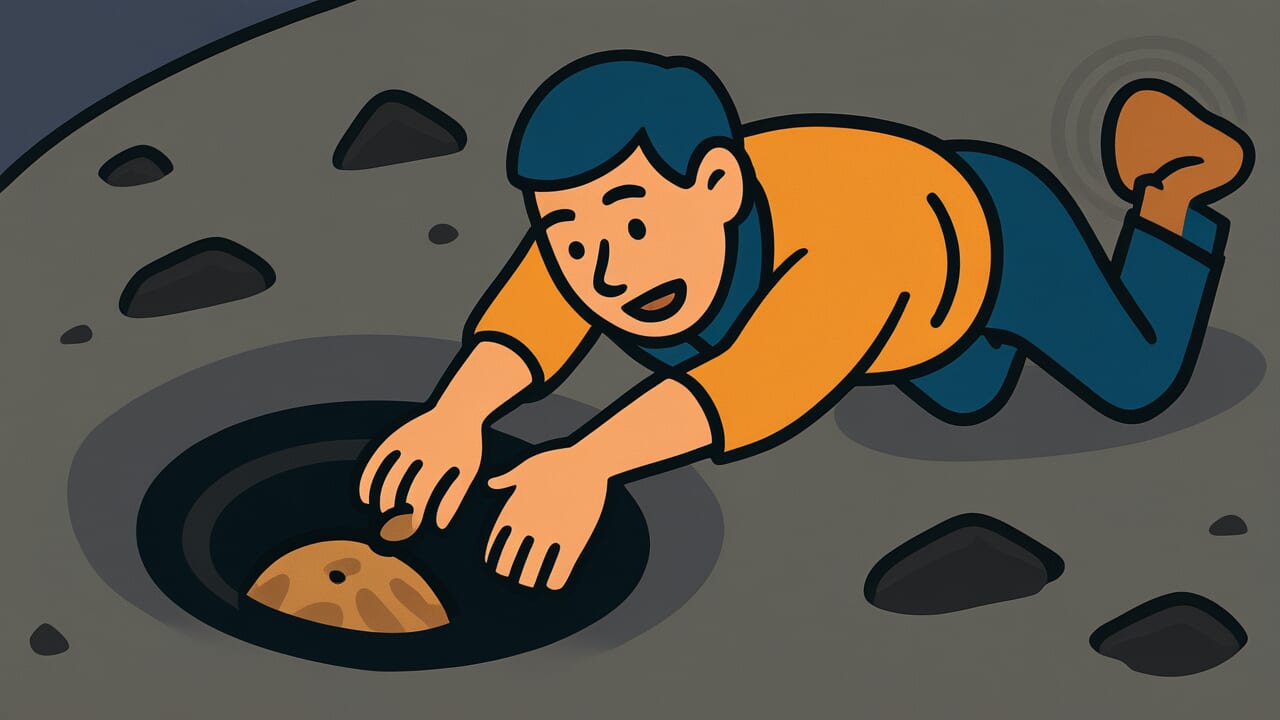How to Read “Drop a stone into a pitfall”
おとしあなにおとしいしをくだす
Meaning of “Drop a stone into a pitfall”
This proverb warns against making things worse for someone who is already in a difficult situation. A person who has fallen into a pitfall is already suffering enough. Dropping a stone on them represents the cruelty of attacking someone when they’re already down.
People use this saying when someone fails or faces misfortune, and others pile on with criticism or blame. For example, when a coworker makes a mistake at work and people attack them unnecessarily or use their position to corner them further.
This expression works because its visual image is so powerful. It makes the inhumanity of such actions impossible to ignore. Even in modern society, it remains meaningful as a warning against lacking consideration for the vulnerable or treating people in trouble with coldness.
Origin and Etymology
The exact first appearance of this proverb in literature is unclear. However, the structure of the phrase reveals an interesting background.
Pitfalls have been used since ancient times for hunting and warfare. People dug deep holes in the ground and covered them with branches and grass to trap prey. Once something fell in, climbing out was nearly impossible. The victim was already in a desperate situation.
Then comes the act of “dropping a stone.” The word “kudasu” means to deliberately drop something from above. This isn’t an accident. Someone is intentionally throwing a stone into the pit.
This proverb is connected to the Chinese idiom “rakusei kaseki” (落井下石). It means throwing stones at someone who has fallen into a well. The structure is exactly the same. This Chinese expression likely influenced how the Japanese proverb developed.
The heartlessness of attacking someone at their weakest moment. This universal negative aspect of human nature is captured in a powerfully visual image.
Usage Examples
- リストラされた同僚の悪口まで言い始めるなんて、落とし穴に落とし石を下すようなものだ
- 病気で休んでいる人の仕事まで批判するのは、落とし穴に落とし石を下す行為だよ
Universal Wisdom
This proverb has been passed down because it reveals deep insight into the cruelty hidden in human hearts. Why do people attack others who are already suffering?
At the root is the psychology of confirming superiority. When we see someone fall, we feel relatively higher in status. Throwing stones is an instinctive move to make that superiority even more certain.
In groups, people also attack the weak to protect themselves from becoming targets. This is a defensive psychology at work.
But this proverb warns us about the foolishness of such behavior. In life, anyone can fall into a pitfall. You might throw stones today but find yourself at the bottom tomorrow. The turns of fate are unpredictable.
Our ancestors understood how we should behave within this cycle of fortune. Mercy toward the weak is actually mercy toward ourselves. This proverb teaches wisdom that values long-term human relationships over short-term feelings of superiority.
When AI Hears This
Throwing stones at someone already in a pitfall is, from a game theory perspective, a strategy of “creating an irreversible situation.” Nobel Prize economist Thomas Schelling showed how deliberately reducing your own options makes others recognize “this person is serious.”
What’s interesting is the double irreversibility of this action. First, the opponent is already in the physical constraint of the pitfall. By throwing stones, you create a situation where “there’s no path to reconciliation anymore.”
This resembles military tactics of burning bridges to cut off retreat. When the enemy knows there’s no retreat, they must conclude “this opponent will never back down.”
Normal game theory says more options are better. But commitment strategy works in reverse. In price negotiations, showing books that prove “any lower price means a loss” convinces the other party “they really are at their limit.”
Dropping stones works similarly. The additional attack sends a signal that “there’s no turning back.” This is information transmitted to the opponent.
The essence of this strategy is manipulating the opponent’s expectations by limiting your own freedom. By completely eliminating any room for the opponent to think “maybe I’ll still be helped,” you paradoxically gain control of the negotiation.
Lessons for Today
This proverb teaches you about what true strength really means. In modern society with developed social media, someone’s failure or misfortune spreads instantly. Many people write critical comments. This is literally “Drop a stone into a pitfall” happening daily in digital space.
But truly strong people don’t attack those who are already down. Rather, those who can extend a hand to people in difficult situations possess real strength. This is an action possible only when your own position is stable. It shows maturity as a human being.
When you encounter someone at work or school who has failed or is struggling, remember these words. Don’t join the criticism. Watch quietly, or if possible, offer support. That choice elevates your own humanity and builds trust from those around you.
Life is a long journey. Things may be smooth today, but tomorrow is uncertain. That’s why building relationships where we support each other is most important of all.



Comments